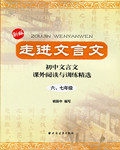题目内容
F____________, a kind and brave peasant passed there and saved the wounded soldier.
Fortunately

 走进文言文系列答案
走进文言文系列答案It doesn't come as a surprise to you to realize that it makes no difference what you read or study if you can't remember it.You just waste your valuable time.1 One dependable aid that does help you remember what you study is to have a specific purpose or reason for reading.
study is to have a specific purpose or reason for reading.
Why does a clerk in a store go away when your reply to her offer to help is, "No, thank you.I'm just looking."? Both you and she know that if you aren't sure what you want, you are not likely to find it.But suppose you say instead, "Yes, thank you.I want a pair of sun glasses." She says, "Right this way, please."
__2_ If you choose a book, "just looking" for nothing in particular, you are likely to get just that—nothing.But if you do know what you want, you are almost sure to get it.Your reasons will vary; they will include reading or studying "to find out more about", "to understand the reasons for" and "to find out how".
__3__ Before you start to study, you say to yourself something like this, "I want to know why Stephen Vincent Benet happened to write about America".Because you know why you are reading or studying, you relate the information to your purpose and remember it better.
4 At least two important processes go on at the same time.As you read, you take in ideas rapidly and accurately.But at the same time you express your own ideas to yourself as you react to what you read.You have a kind of  mental conversation with the author.
mental conversation with the author.
This additional process of thinking about what you read includes evaluating it, relating it to what you already know, and using it for your own purposes.__5__ One part of critical reading, as you have discovered, is distinguishing between facts and opinions.Facts can be checked by evidence, Opin ions are one's own personal reactions.Another part of critical reading is judging sources.Still another part is drawing accurate inferences.
ions are one's own personal reactions.Another part of critical reading is judging sources.Still another part is drawing accurate inferences.
| A.Maybe you have already discovered some clever ways to keep yourself from forgetting. |
| B.It is important for students to have a positive attitude to their study. |
| C.You remember better when you know what you' re reading. |
| D.In other words, a good reader is a critical reader. |
F.Reading is not one single activity.
G.This is the way it works.
How to Make Friends
Friendship is a very important human relationship and everyone needs good friends. Good friendship has many benefits. It offers companionship, improves self-worth and promotes good health. There are times in our lives such as when we have recently moved into a new town, or changed our jobs or schools. Such changes often leave us without a friend. 【小题1】 . But for many of us the process is difficult and requires courage. Below are some helpful suggestions on how to make and keep friends.
1. Associate with others.
The first step to making friends is associating with other people. You can go to public places to meet new people. Besides, you will need to make yourself known by becoming an active member of such places.
2. Start a conversation.
Starting a conversation is the second most important step in making new friends. 【小题2】 . You can always start the conversation. Being able to make small talk is a very useful skill in relating with other people.
3. 【小题3】 .
Choosing friends with common interests is important in building friendship as these interests would always bring you and your friend together. Hanging out will always be a pleasant experience.
4. Let it grow.
It is a good thing to stay in touch. However, try not to press your new friend with calls, messages or visits as this would likely wear him or her out and finally you may lose your friend. 【小题4】 . The best friendships are the ones that grow naturally.
5. Enjoy your friendship.
The best way to enjoy your friendship is to allow your friends to be themselves. 【小题5】 . Try not to change them from who they are to what you want them to be. Become the kind of friend you will want your friend to be to you.
| A.Be cheerful. |
| B.Do things together. |
| C.Do not wait to be spoken to |
| D.Try not to find fault with your friends. |
F. For a friendship to develop you need to stay in touch.
G. So you will need to give your friend time to react to you.